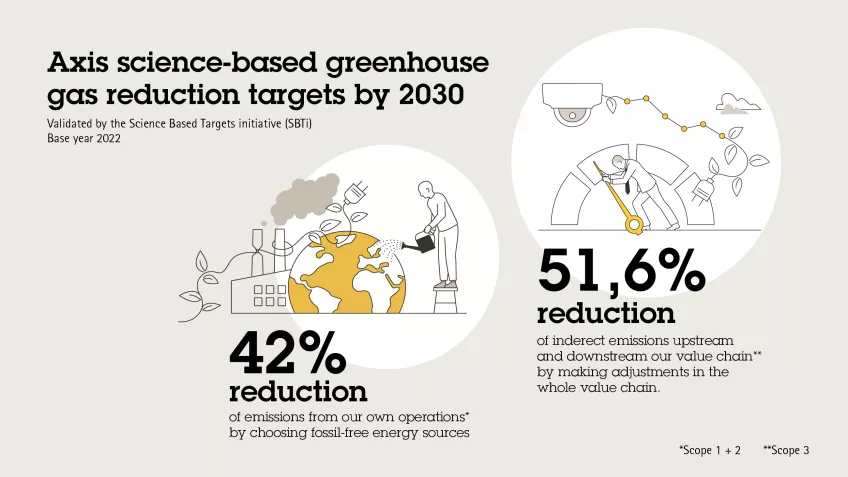
In line with an ongoing commitment to reduce the impact of its own operations and its value chain on the environment, the near-term targets Axis Communications AB has set to reduce its total global greenhouse gas emissions have been validated by the Science Based Targets initiative (SBTi).
Axis commits to reduce absolute scope 1 and 2 greenhouse gas emissions 42% by 2030 from a 2022 base year. Axis also commits to reduce scope 3 greenhouse gas emissions from purchased goods and services, upstream transportation and distribution, and use of sold products 51.6% per sold unit within the same timeframe.

Scope 1 and 2 emissions are those created directly and indirectly by Axis global operations. Scope 3 emissions are those created by the entire Axis value chain, including the manufacture of Axis products by third parties and the use of Axis products over their lifetime.
Axis is one of more than 5,000 organizations around the world supporting science-based targets for greenhouse gas emission reduction. The targets are in line with the level of decarbonization required to meet the goals of the Paris Agreement, to limit global warming to well-below 2°C above pre-industrial levels and pursue efforts to limit warming to 1.5°C.
Carl Trotzig, Director Environment & Supply Chain Sustainability at Axis, commented: “Axis has long been committed to reducing the impact of our entire value chain on the environment. This includes identifying the key areas of focus for reducing emissions within our own business, our suppliers and manufacturers, and in the lifetime use of our products. Taking a science-based approach fits with our ethos, and having our targets validated by the SBTi only adds more momentum to our efforts.”
Among other measures in terms of scope 1 and 2 emissions, Axis is reviewing energy provider contracts around the world to ensure that as much energy as possible comes from fossil-free sources and transitioning vehicle fleets to electric vehicles.
Axis has long been committed to reducing the impact of our entire value chain on the environment
Carl Trotzig adds: “Scope 3 emissions – by far the largest source of emissions across the Axis value chain – are obviously a particular focus for reduction. Within this, reducing the emissions associated with the lifetime use of Axis products will be a priority. We’ve already introduced features to help customers better manage and optimize the energy use of our cameras, but we will also take a whole system perspective, including the impact of data centers and cloud-based services.”
The additional priority areas related to the scope 3 emissions are component/product manufacturing and transportation. To support progress in these areas, Axis will drive a move towards more energy sourced from fossil-free sources in manufacturing, and further regionalization of the company’s supply chain to reduce transportation requirements.
The commitment to meeting science-based emissions reduction targets reflects ongoing initiatives to reduce the environmental impact of Axis operations and that of its upstream and downstream value chain. The company’s efforts support three pillars: beating climate change, protecting natural resources, and protecting ecosystems. For more information go to our webpage.
About the Science Based Targets initiative
The Science Based Targets initiative (SBTi) is a global body enabling businesses to set ambitious emissions reductions targets in line with the latest climate science. It is focused on accelerating companies across the world to halve emissions before 2030 and achieve net-zero emissions before 2050.
The initiative is a collaboration between CDP, the United Nations Global Compact, World Resources Institute (WRI) and the World Wide Fund for Nature (WWF) and one of the We Mean Business Coalition commitments. The SBTi defines and promotes best practice in science-based target setting, offers resources and guidance to reduce barriers to adoption, and independently assesses and approves companies’ targets.

Axis enables a smarter and safer world by improving security, safety, operational efficiency, and business intelligence. As a network technology company and industry leader, Axis offers video surveillance, access control, intercoms, and audio solutions. These are enhanced by intelligent analytics applications and supported by high-quality training.
Axis has around 5,000 dedicated employees in over 50 countries and collaborates with technology and system integration partners worldwide to deliver customer solutions. Axis was founded in 1984, and the headquarters are in Lund, Sweden.